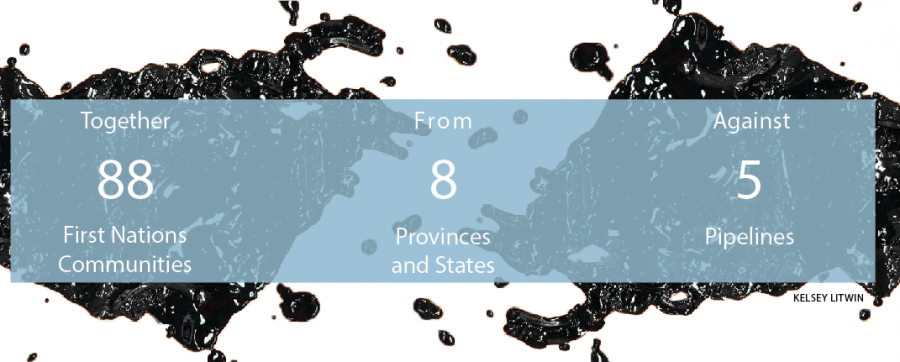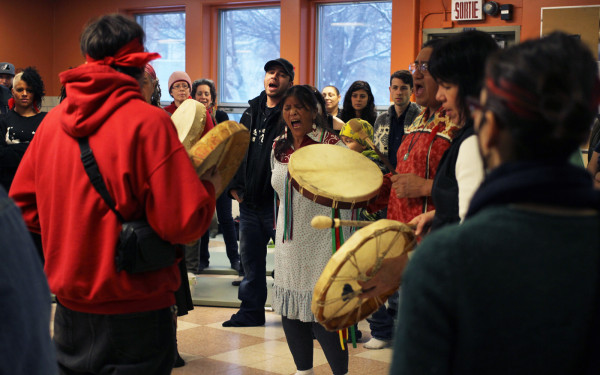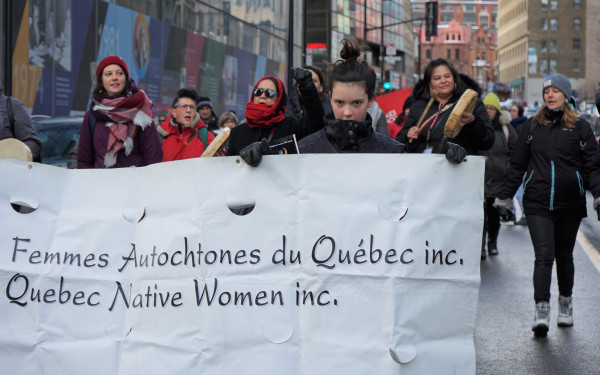New Treaty Opposes Pipeline Construction
First Nations Across the Country Come Together to Defend Their Land
The inside of an oil pipeline is essentially hell.
Tepid black sludge pumps through shining steel arteries, pulsing and pushing under the earth—buckling, bending and bracing against soil and rock.
The oil flows slowly, its own slurry catching the sides of the pipes—a self-blocking blood flow that must be scraped off its own walls by robots that live in the tar. Concrete temples dot the path of the line, impelling the oil further—an integrated mechanized bypass-slash-heartbeat.
Great sections rise from the ground, heaving on wooden slats, proclaiming: “I am Oil, and you are mine, oh land, oh Canada.”
From Vancouver to Montreal, from the proposed ends of the Northern Gateway to Energy East, from Musqueam to Kanehsatà:ke, First Nations are replying—with a treaty.
“We have inhabited, protected and governed our territories according to our respective laws and traditions since time immemorial,” it says. “Tar Sands expansion is a collective threat to our Nations. It requires a collective response.”
On Thursday, Sept. 22, a treaty alliance was announced between First Nations in Canada and the United States, uniting the signatories against the development of pipelines on their territories—specifically pipelines to export Alberta’s tar sands oil to coastal distribution centers.
As of Sept. 26, 88 nations have signed.
Grand Chief Serge Simon of Kanehsatà:ke, a key player in the development of the treaty, said the alliance has been in the making for a year and a half.
“A lot of people in this province were starting to say, ‘No, no way,’” said Simon about the Energy East project. The proposed pipeline would carry Albertan heavy crude through Montreal and on to New Brunswick.
After a meeting with Geraldine Thomas-Flurer, spokesperson for the west-coast Yinka Dene Alliance, to discuss the realities of opposing the Kinder Morgan Trans-Mountain pipeline—one that would carry oil from Alberta to the west coast of British Columbia—Simon said that’s when the idea of the treaty was born.
“We took a chance,” he said. “‘Okay, let’s see if this thing comes out, if we get a lot of signatures.’ It was overwhelming.”
The treaty crosses borders, not just provincially, but internationally. It includes the Standing Rock Sioux Tribe, who is leading ongoing protests against the Dakota Access Pipeline in North Dakota, as well as others in Minnesota and Washington in the U.S.
The idea is that if any First Nation’s land and sovereignty is threatened by pipeline development—the way that Standing Rock’s is—then the other signatories will come defend it.
“We have access to quite a bit of resources if we pool together,” said Simon.
The treaty has created some controversy among Indigenous grassroots activists.
“There’s a recognition in our sovereignty, in our ties, and our nations are crossing international boundaries. There’s a unified front against tar sands, which I’m elated by.” — Clifton Nicholas, a Kanehsatà:ke community organizer
Ellen Gabriel, a prominent Indigenous activist from Kanehsatà:ke—she was the spokesperson for the community during the Oka crisis—posted on Facebook following the signing.
“The idea of a Treaty Alliance is a good one and important in this struggle,” she wrote, “but the Treaty was signed without following protocol for several communities, especially Kanehsatà:ke.”
Simon feels otherwise.
“Grassroots were saying you did this all wrong, you don’t even have the First Nations involved in this who are in Alberta,” Simon said. “They were saying it would have been insulting to them, they weren’t invited to this thing, but they were. They were invited.”
Simon said he reached out to Chief Allen Adam of Athabasca Chipewyan First Nation months and then days before the treaty was announced, and again following the treaty’s announcement.
“I think it needed to be proven to these First Nations that we’re serious, and what this is all about.”
Clifton Nicholas, a community organizer in Kanehsatà:ke, also has mixed feelings about the treaty process—but not the treaty itself.
“There’s a recognition in our sovereignty, in our ties, and our nations are crossing international boundaries,” Nicholas said. “There’s a unified front against tar sands, which I’m elated by.”
Nicholas explained there has always been a divide between government-sanctioned bodies on reserves and traditional governments. In his eyes, government sanctioned councils—like the one Grand Chief Simon leads—often follow the progressive politics of the traditional governments.
“There has to be more unity between traditional governments and government-sanctioned governments,” he said.
Where grassroots and council leaders share emphasis, though, is that settler activists need to stand and support this treaty.
“We’re only as strong as the allies that we have,” Nicholas said. “Over the last couple years, people have been realizing we need to include Indigenous people in the fight. If not, the validity kind of goes out the window.”
“If they really want to stop these pipelines, these tar sands, the expansion,” Simon said, “This is how we’re going to do it.”
But Simon wants the leadership with allies to be clear. “We are not joining your group. You are joining us.”
As for the immediate future, Simon said there are plans to take joint action against Kinder Morgan’s Trans-Mountain pipeline, should the Canadian government approve it in December.
The Trans-Mountain was the target of large-scale Indigenous and community protests in Fall 2014 in Burnaby, B.C. when Kinder Morgan employees attempted to begin survey work. The Trudeau administration has repeatedly expressed support for the pipeline, despite its lack of approval locally.
Natural Resource Minister Jim Carr—upon whose shoulders rests the fate of the pipelines, including Trans-Mountain—said on CBC’s The House that the treaty doesn’t actually show unity among First Nations leaders.
“He doesn’t get it yet,” said Simon in response to Carr. “You have [88] bands vowing to stop pipelines coming from tar sands, and if everyone takes action across the country he’ll see just how relevant our treaty is.”




_600_375_s_c1.png)

_600_375_90_s_c1.jpg)
